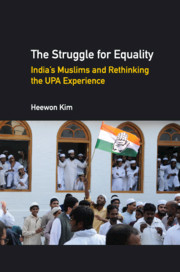Book contents
- Frontmatter
- Dedication
- Contents
- List of Tables and Figures
- List of Abbreviations
- Acknowledgements
- Introduction
- 1 Opening Up the ‘Black Box’ of Public Policy: Towards an Institutional Analysis of India's Policies on Religious Minorities
- 2 Constitution-Making, Equality of Opportunity and Religious Minorities: Reassessing the Critical Juncture
- 3 The UPA in Power: The New Equal Opportunities Framework, Religious Minorities and the Limits of Change
- 4 UPA, Muslims and Public Sector Employment: Assessing the Record
- 5 UPA, Muslims and Service Delivery
- 6 UPA, Muslims and the Communal Violence Bill
- Conclusion
- Appendix Recruitment of minorities in central government departments and public sector undertakings
- Bibliography
- Index
2 - Constitution-Making, Equality of Opportunity and Religious Minorities: Reassessing the Critical Juncture
Published online by Cambridge University Press: 12 February 2019
- Frontmatter
- Dedication
- Contents
- List of Tables and Figures
- List of Abbreviations
- Acknowledgements
- Introduction
- 1 Opening Up the ‘Black Box’ of Public Policy: Towards an Institutional Analysis of India's Policies on Religious Minorities
- 2 Constitution-Making, Equality of Opportunity and Religious Minorities: Reassessing the Critical Juncture
- 3 The UPA in Power: The New Equal Opportunities Framework, Religious Minorities and the Limits of Change
- 4 UPA, Muslims and Public Sector Employment: Assessing the Record
- 5 UPA, Muslims and Service Delivery
- 6 UPA, Muslims and the Communal Violence Bill
- Conclusion
- Appendix Recruitment of minorities in central government departments and public sector undertakings
- Bibliography
- Index
Summary
Introduction
Constitution-making between 1946 and 1949 marked a fundamental rupture with the regime of rights of religious minorities under the colonial state: it was a critical juncture which created a template for how these rights were to be defined within a new framework of equality of opportunity. Unsurprisingly, India's religious minorities have struggled to work within a secular framework that has denied political claims to religious identities, with the result that some minorities, especially Christians, Muslims and Sikhs have, arguably, suffered disadvantage and discrimination on issues of security, identity and underdevelopment. Drawing on historical institutionalism and its associated concept of path dependence, this chapter provides an overview of how this settlement has evolved since 1947. First, it outlines the framework of equality of opportunity established at Independence and reviews the institutional framework that has emerged to support ‘competing equalities’ among socioeconomically disadvantaged caste and non-caste groups. It then briefly reviews some of the contestational junctures—the early 1980s, 1990s and 2000s— when some of the minorities mobilised and challenged this settlement. Finally, with reference to the findings of the SCR that some religious minorities, particularly poor Muslims, suffer systematic discrimination and disadvantage, this chapter discusses the official recognition by the UPA that a new approach was required to redefine equality of opportunity in twenty-first century India.
Constitution-Making as a Critical Juncture: Redefining Minority Rights
India is a religiously and ethnically diverse society and home to major world traditions: Hindus (79.8 per cent), Muslims (14.2 per cent), Christians (2.3 per cent), Sikhs (1.7 per cent), Buddhists (0.7 per cent), Jains (0.4 per cent) and Zoroastrians (no data). Hindus constitute the overwhelming majority, with 172.2 million Muslims being the second-largest faith tradition (Ministry of Home Affairs 2011b). This religious diversity is overlaid with enormous linguistic and cultural diversity. Politically, accommodating such diversity was a major challenge faced by the framers of the Constitution.
The dominant view articulated by the Congress during the Constituent Assembly Debate was that separate political representation of religious communities under British colonial rule had resulted in the partition of the country and the creation of Pakistan.
- Type
- Chapter
- Information
- The Struggle for EqualityIndia's Muslims and Rethinking the UPA Experience, pp. 39 - 64Publisher: Cambridge University PressPrint publication year: 2019



